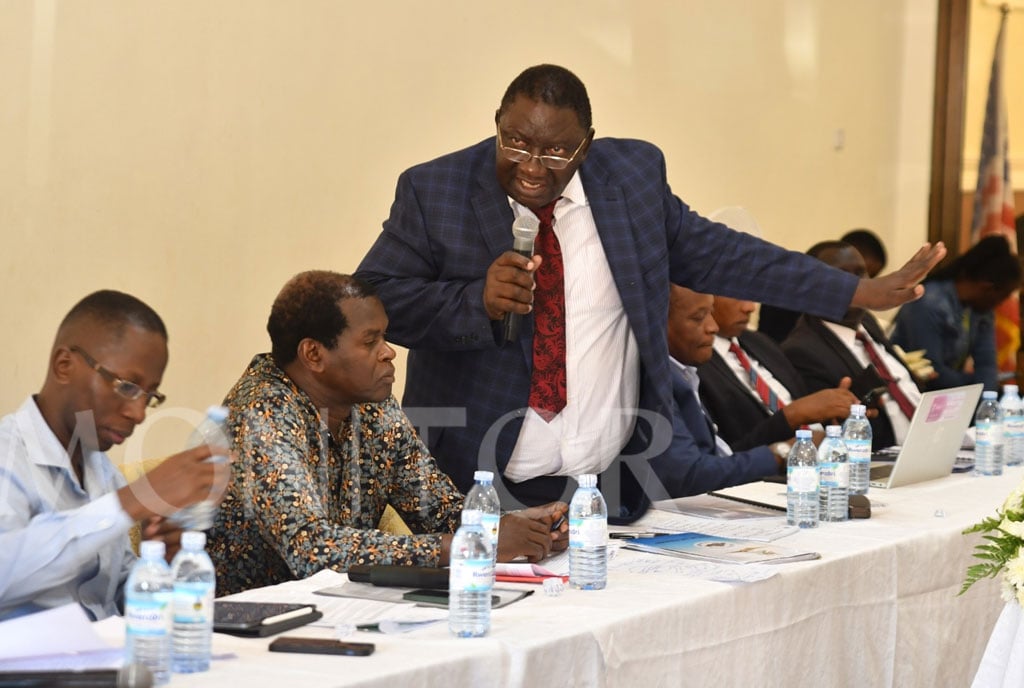Prime
DR Congo refugees start journey back home

Congolese refugees returning to their country recently. PHOTO/ROBERT MUHEREZA
What you need to know:
- With pouring Congolese allowed in unchecked and uncounted due to their overwhelming numbers, local leaders in Kisoro yesterday questioned how UNHCR had approximated the influx at 11,000.
The United Nations refugee agency, UNHCR yesterday said the number of Congolese nationals who fled to Uganda following renewed fighting in North Kivu province, had grossed 11,000.
“Some 8,000 asylum-seekers crossed at Bunagana [border] town and another 3,000 at Kibaya border point in Kisoro District,” the agency noted in story on its website about the humanitarian tragedy.
With pouring Congolese allowed in unchecked and uncounted due to their overwhelming numbers, local leaders in Kisoro yesterday questioned how UNHCR had approximated the influx at 11,000.
By Monday evening, about 560 Congolese had been registered at Nyakabande refugee transit camp, although thousands were still camped at Bunagana border point, according to Mr Nick Muneza, the Kisoro assistant district health officer-in-charge disease prevention.
Two pregnant Congolese women among the new arrivals were rushed for medical attention following the exhausting trek and were delivered of healthy babies at Kisoro Hospital, Ms Prime Rose Natukunda, the Uganda Red Cross Society branch manager in Kisoro, said.
Uganda is hailed globally for its liberal refugee policy and its a geographical neighbour to DRC, which officials said explained why the Congolese ran for safety in Uganda and not other countries.
As of September 30, 2021, Uganda’s refugee population stood at 1.5 million, according to the UN refugee agency, making it the largest refugee-hosting country in Africa and third worldwide.
News about Congolese nationals seeking refuge in Uganda exceeding 11,000 came to light hours before some of them began trooping back home after their security officials gave safety assurances.

Some of the Congolese families returning home yesterday.
Officials of the Democratic Republic of Congo (DRC) said their soldiers launched a counter-offensive and dislodged March 23 Movement, or M23, rebels who had made lightning gains following surprise attacks on government forces in Chanzu, or Tshanzu, Runyonyi and Kanyamahoro --- all in the restive North Kivu --- on Sunday night.
The announcement of normalcy returning to the battlefields followed an 11am meeting in Kisoro between Ugandan security team led by the Kisoro Resident District Commissioner, Mr Peter Mugisha, and their Congolese counterparts led by Mr Niyibizi Seruhungo and Jean Bosco Mugalu.
It resolved that willing Congolese nationals, who on Monday and yesterday camped at Bunagana market and Nyakabande refugee transit camp, both in Kisoro, be encouraged to return home.
“The security situation in our country is now normal and all of you are encouraged to pack your belongings and cross back home. Our government security teams are now fully in charge of the troubled areas and now you are free to go back home,” Congo’s security points man in Bunagana, Mr Niyibizi Seruhungo, said.
Congolese women and children responded with shouts of joy.
“I thank God and the government forces that the fragile security situation in my home country has normalised. I hope my other belongings at home are still safe because I picked my children and a few household items when heavy gun fire started rocking the sky on Sunday night. God is good!” said Ms Mariam Mabenasha as she began a treacherous trip home.
M23 rebels on Sunday night conducted surprise raids on the bases of Congolese military at Chanzu, alternately called Tshanzu, in North Kivu province and other places, sending Congolese government troops fleeing in the dark.
The Forces Armées de la République Démocratique du Congo or FARDC, as the Congo military is officially called, then reorganised and reinforced for a blistering counter-attack that pushed the insurgents back.
We could not independently confirm if the rebels had withdrawn or how long the apparent lull in fighting would last.
Dozens of transit goods vehicles destined for Goma, the provincial capital of North Kivu where the Sunday night fighting erupted, were still parked at Bunagana border post by 4pm yesterday, with the drivers saying that they need more time to monitor the fluid security situation.

“We shall be here for some time until we are sure that the security situation along the Bunagana-Goma road is normal,” one driver said, asking not to be named for fear of being reprimanded by the employer.
Kisoro RDC Mugisha, who chairs the district security committee, said it was a relief that calm had reportedly returned to DRC because it was becoming difficult to handle the displaced Congolese.
“We had started receiving cases of Ugandans complaining that the domestic animals which the refugees came with had started destroying their crops,” he said.
The RDC asked Congolese refugees renting accommodation in Kisoro and Bunagana towns to also go back to their country, a comment likely to raise eyebrows as refugees under international humanitarian law cannot be forced to return home where they feel unsafe.
Kisoro assistant DHO Muneza asked health workers treating new arrivals to observe Covid-19 standard operating procedures because the Congolese were allowed in without properly screening due to their overwhelming numbers.
“We did not get serious health problems because at Bunagana market and Nyakabande refugee transit camp, we have enough public toilets and standby health workers that provided treatment to those that developed body pains,” he said.
Mr Muneza appealed to the government to allocate more medicines and health commodities to Kisoro District to prepare it for unplanned cross-border emergencies and humanitarian crisis such as the Monday influx.



